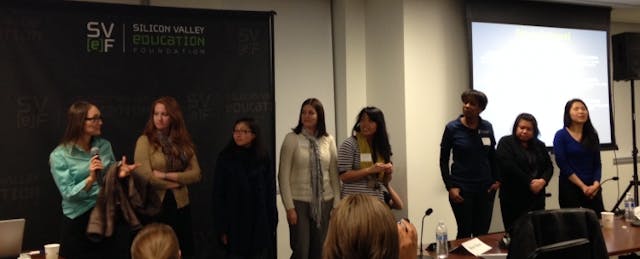Silicon Valley schools and entrepreneurs have been collaborating informally for years. And even though these schools are constantly peppered with requests to pilot products, many still see the schools as behind the innovation curve.
“In our schools you wouldn’t know if this was Silicon Valley or the Midwest or Mississippi because we haven’t been able to harness the innovation in our backyard,” says Muhammed Chaudhry, CEO of Silicon Valley Education Foundation. “We want to change this. We want to create an ecosystem where innovation is in the DNA of our schools.”
To begin creating this ecosystem, the Silicon Valley Education Foundation (SVEF), in partnership with NewSchools Venture Fund, is launching The Learning Innovation Hub (iHub) with $100,000 support from the Gates Foundation. Much like innovation efforts in New York, the iHub hopes to bring together entrepreneurs and educators, facilitate short-term efficacy studies, and help train educators to evaluate which products work for them.
The program kicked off Feb. 3 with ten companies competing for four spots in the iHub’s first project: a four-month efficacy study in which eight teacher fellows will pilot middle-school math products. (The teachers will each be paid $1,750 for working closely with entrepreneurs to help iterate the product.) At the end of the four months, the iHub will measure and compare student achievement data and share the result in July.
Eighty companies applied; 10 finalists were chosen:
- Blendspace
- CueThink
- eduCannon
- Front Row Education
- Knowmadix
- Knowre
- LearnBop
- MathMarker
- StageLearn
- Zaption
The “Shark Tank”-esque competition consisted of two rounds. During the first round, school administrators judged the products for how easily they could be adopted in classrooms and whether they could impact student achievement. Judges Blanca Herrera (Principal and Entrepreneur from Ida Jew Academies), Craig Blackburn (Director of Santa Clara County Office of Education) and Kathy Gomez (Superintendent of Evergreen School District) drilled the entrepreneurs with questions about Common Core, data exporting, teacher control over assigning content, and the ability to share and collaborate.
By the second round, MathMaker and Knowmadix had been eliminated by the judges; Knowre was cut as well, as founder David Joo’s flight was delayed. The remaining seven then pitched to a panel of business leaders that included Bruce Chizen (former CEO of Adobe), Dave House (Chairman of the Board at Brocade), Shawn T. Carolan (Managing Director of Menlo Ventures), Jorge Titinger (President and CEO of SGI), and--yes--Ronnie Lott (former San Francisco 49er and NFL Hall of Famer). Entrepreneurs were asked to name their competitors, dissect their user numbers, and explain their plans to scale.
The business judges ultimately picked Blendspace, Front Row, LearnBop, and Zaption as the winners. But in giving them the final say in what tools would be piloted in classroom, it appeared there was a disconnect between the tools that teachers want, and those deemed to be financially stable. This was especially true as one crowd favorite among the teachers in attendance, CueThink, didn’t make the cut.
Organizers have suggested they are open to experimenting with different ways to design the competition in the future, which could include teaching fellows in the final judging round.
“The next question is: How do we scale this?” says Chaudhry. He anticipates the need to get broader superintendent support in order for iHub to develop a culture that makes it OK for schools to take risks. “And that’s not something you pay for or insert through a pill. It’s a DNA thing," he says.


